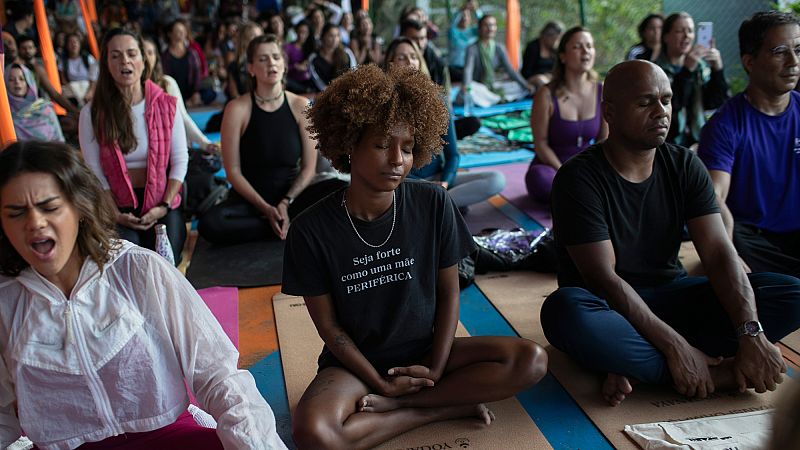Expanding Access to Yoga Education
A groundbreaking initiative has been launched by Yoganaya International School in collaboration with the company Mude. This program aims to train approximately 180 future yoga teachers from low-income communities in Rio de Janeiro and São Paulo over a period of 14 months. The initiative is designed not only to provide education but also to create long-term opportunities for participants, helping them build sustainable careers in their local areas.
Comprehensive Support for Participants
Participants in the program receive more than just training. They are provided with essential resources such as uniforms, yoga mats, speakers, and microphones, which are crucial for delivering effective yoga sessions. Additionally, they receive stipends to support them during their studies and assistance when transitioning into the job market. This comprehensive approach ensures that individuals from economically disadvantaged backgrounds can fully engage in the program without financial barriers.
A Personal Journey: From Hairdresser to Yoga Teacher
One of the most inspiring stories within this initiative is that of Luciene Costa, a 54-year-old hairdresser from Rio. She first turned to yoga as a way to manage her back pain. However, what began as a personal health journey has now evolved into a dream of leaving her salon behind and becoming a yoga teacher. Her story highlights how the program is not only about teaching yoga but also about empowering individuals to pursue new paths and transform their lives.
Breaking Stereotypes and Promoting Inclusivity
The organizers of the initiative have a broader vision beyond just providing training. They hope to challenge the perception of yoga as an activity reserved for the elite. By bringing yoga education to underprivileged communities, they aim to make it more accessible and inclusive. This effort is part of a larger movement to ensure that yoga is not seen as a luxury but as a valuable practice that can benefit people from all walks of life.
Long-Term Impact on Favelas
The project is particularly significant for the favelas, where economic challenges often limit access to educational and professional opportunities. By offering training and support, the initiative seeks to create a ripple effect that extends beyond individual participants. As more people gain the skills and confidence to teach yoga, it could lead to the development of local yoga communities and even small businesses centered around wellness and fitness.
Encouraging Sustainable Careers
Another key goal of the program is to encourage sustainable careers in the favelas. Traditional employment opportunities in these areas are often limited, making it difficult for residents to achieve financial stability. By equipping participants with the skills needed to become yoga teachers, the initiative provides an alternative career path that is both meaningful and financially viable. This can help reduce dependency on unstable or informal jobs and promote long-term economic growth.
Building a Stronger Community
Beyond individual success, the program also fosters a sense of community among participants. Sharing experiences and learning together can create strong bonds and a supportive network. This collective effort can be especially valuable in areas where social and economic disparities are prevalent. The initiative is not just about teaching yoga; it’s about building a foundation for a healthier, more empowered community.
Looking Ahead
As the program progresses, the focus remains on ensuring that every participant has the tools and encouragement needed to succeed. The success of this initiative could serve as a model for similar programs in other regions, demonstrating the potential of yoga education to drive positive change. With continued support and commitment, the vision of making yoga accessible to all may soon become a reality.







